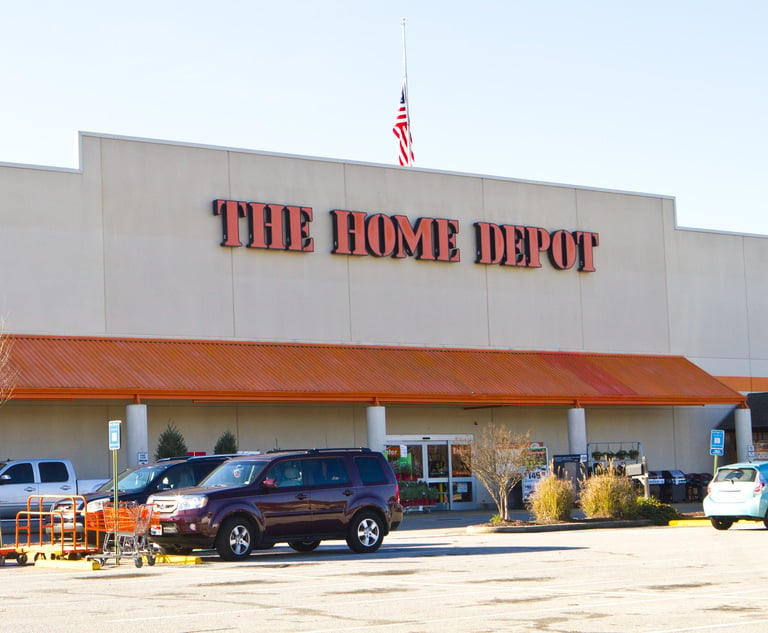Gig Economy Plaintiffs Will Test-Drive New SCOTUS Ruling Against Arbitration
Plaintiffs and management-side lawyers will assess whether and how the U.S. Supreme Court's "New Prime" ruling can be applied to on-demand transportation workers.
February 12, 2019 at 02:32 PM
5 minute read
 Photo: Diego M. Radzinschi/ALM
Photo: Diego M. Radzinschi/ALM
Gig economy companies such as Uber, GrubHub and Lyft will face renewed arguments against the arbitration agreements their drivers are forced to sign, as plaintiffs lawyers test the scope of a new U.S. Supreme Court ruling to keep cases in the courtroom.
The Supreme Court's unanimous decision in January in New Prime v. Oliveira clarified that an exemption for “transportation workers” in the Federal Arbitration Act applies to both independent contractors and employees who engage in interstate commerce.
The decision marked a rare strike against arbitration by the Supreme Court, which has issued rulings in recent years bolstering the power of employers and companies to stop workers and consumers from taking disputes to court.
Now, questions have surfaced about whether the New Prime ruling could be expanded to the gig economy, where companies that employ on-demand drivers have used arbitration agreements to stop disputes involving worker classification and wages from going to court.
Already in the weeks since the ruling was issued, there are signs plaintiffs lawyers will use the opinion to reinforce their arguments that drivers who signed arbitration agreements should nonetheless be allowed to sue their employers in court. The U.S. Chamber of Commerce warned the justices that “untold thousands of arbitration agreements would be called into question” if the court ruled for the truck drivers.
➤➤ Get employment law news and commentary straight to your inbox with Labor of Law, a new Law.com briefing. Learn more and sign up here.
A central question in many gig economy cases revolves around worker classification. Uber, Lyft and other companies consider their drivers to be contractors, working flexible schedules but not entitled to certain benefits and other labor rights accorded to employees.
“Many gig-economy companies to date have labeled their drivers 'independent contractors' in an attempt to avoid wage-and-hour and other employment laws. New Prime makes it clear they won't be able to use that label to force their drivers into arbitration,” Rick Bales, a professor at Ohio Northern University College of Law, said in a recent blog post.
On-demand companies are expected to argue that their drivers should not fall under the exemption for “transportation workers” such as truck drivers because they do not engage in “interstate commerce.” Trial and appeals courts will now look at whether and how often on-demand drivers can be considered participating in “interstate commerce.”
Shannon Liss-Riordan, a partner at Boston's Licthen & Liss-Riordan who has fought for on-demand drivers, said in an interview she has argued for years that drivers fighting to bring their claims to court should fall into the transportation worker exception. She has already alerted judges in pending cases to the New Prime decision.
Some cases in federal court were put on hold pending the New Prime decision. A case against Amazon.com Inc. on behalf of drivers was stayed until the decision was reached and Liss-Riordan alerted the court to the potential impact. She's also making the argument in a number of her cases on behalf of drivers for food delivery companies. These include a collective action against GrubHub in Chicago on behalf of 7,000 drivers, another against Postmates, now pending in the U.S. Court of Appeals for the Ninth Circuit, and another against DoorDash.
“The case just confirms we should be eligible for the exemption,” Liss-Riordan said. “We are entitled either way, but the New Prime decision is helpful because it clarifies the court does not need to decide whether the workers are employees.”
Domenique Camacho Moran, a labor and employment partner at Farrell Fritz in New York, said there is still uncertainty about whether gig economy drivers will fall under the exemption outlined in the FAA. “That's the million-dollar question,” she said.
Moran said it won't be an “easy argument” for companies such as Uber and Lyft to contend their drivers should not fall under the arbitration exemption for transportation workers.
“We are seeing now arbitration agreements may be a useful vehicle for resolving disputes expeditiously, but there may not be a wholesale rubber stamp,” Moran said.
Still, some state laws that govern arbitration disputes could limit the reach of the Supreme Court's decision.
“If the Federal Arbitration Act doesn't apply, state statutes or common law may still mandate arbitration of the dispute,” Moran said.
Fisher & Phillips partner Anderson Scott in Atlanta said he has yet to see any new cases that rely solely on New Prime.
The management-side law firm posted an advisory, co-written by Scott and Felix Digilov, noting commentary about whether gig economy companies should be worried. There's no immediate resolution, but “the evolution of the New Prime decision—and whether it bleeds into the gig economy—will be 'interesting.'”
Read more:
Gorsuch's Unanimous Arbitration Ruling Is Loss for Business
Kavanaugh's First Opinion Is Unanimous Win for Arbitration
Writing Styles of Gorsuch and Kavanaugh Revealed in Arbitration Rulings
Senator's SCOTUS Brief Challenges Wave of Pro-Arbitration Decisions
This content has been archived. It is available through our partners, LexisNexis® and Bloomberg Law.
To view this content, please continue to their sites.
Not a Lexis Subscriber?
Subscribe Now
Not a Bloomberg Law Subscriber?
Subscribe Now
NOT FOR REPRINT
© 2025 ALM Global, LLC, All Rights Reserved. Request academic re-use from www.copyright.com. All other uses, submit a request to [email protected]. For more information visit Asset & Logo Licensing.
You Might Like
View All
Insurance Policies Don’t Cover Home Depot's Data Breach Costs, 6th Circuit Says

'Religious Discrimination'?: 4th Circuit Revives Challenge to Employer Vaccine Mandate
2 minute read
Standing Spat: Split 2nd Circuit Lets Challenge to Pfizer Diversity Program Proceed

Fight Over Amicus-Funding Disclosure Surfaces in Google Play Appeal
Trending Stories
- 1Court Rejects San Francisco's Challenge to Robotaxi Licenses
- 2'Be Prepared and Practice': Paul Hastings' Michelle Reed Breaks Down Firm's First SEC Cybersecurity Incident Disclosure Report
- 3Lina Khan Gives Up the Gavel After Contentious 4 Years as FTC Chair
- 4Allstate Is Using Cell Phone Data to Raise Prices, Attorney General Claims
- 5Epiq Announces AI Discovery Assistant, Initially Developed by Laer AI, With Help From Sullivan & Cromwell
Who Got The Work
J. Brugh Lower of Gibbons has entered an appearance for industrial equipment supplier Devco Corporation in a pending trademark infringement lawsuit. The suit, accusing the defendant of selling knock-off Graco products, was filed Dec. 18 in New Jersey District Court by Rivkin Radler on behalf of Graco Inc. and Graco Minnesota. The case, assigned to U.S. District Judge Zahid N. Quraishi, is 3:24-cv-11294, Graco Inc. et al v. Devco Corporation.
Who Got The Work
Rebecca Maller-Stein and Kent A. Yalowitz of Arnold & Porter Kaye Scholer have entered their appearances for Hanaco Venture Capital and its executives, Lior Prosor and David Frankel, in a pending securities lawsuit. The action, filed on Dec. 24 in New York Southern District Court by Zell, Aron & Co. on behalf of Goldeneye Advisors, accuses the defendants of negligently and fraudulently managing the plaintiff's $1 million investment. The case, assigned to U.S. District Judge Vernon S. Broderick, is 1:24-cv-09918, Goldeneye Advisors, LLC v. Hanaco Venture Capital, Ltd. et al.
Who Got The Work
Attorneys from A&O Shearman has stepped in as defense counsel for Toronto-Dominion Bank and other defendants in a pending securities class action. The suit, filed Dec. 11 in New York Southern District Court by Bleichmar Fonti & Auld, accuses the defendants of concealing the bank's 'pervasive' deficiencies in regards to its compliance with the Bank Secrecy Act and the quality of its anti-money laundering controls. The case, assigned to U.S. District Judge Arun Subramanian, is 1:24-cv-09445, Gonzalez v. The Toronto-Dominion Bank et al.
Who Got The Work
Crown Castle International, a Pennsylvania company providing shared communications infrastructure, has turned to Luke D. Wolf of Gordon Rees Scully Mansukhani to fend off a pending breach-of-contract lawsuit. The court action, filed Nov. 25 in Michigan Eastern District Court by Hooper Hathaway PC on behalf of The Town Residences LLC, accuses Crown Castle of failing to transfer approximately $30,000 in utility payments from T-Mobile in breach of a roof-top lease and assignment agreement. The case, assigned to U.S. District Judge Susan K. Declercq, is 2:24-cv-13131, The Town Residences LLC v. T-Mobile US, Inc. et al.
Who Got The Work
Wilfred P. Coronato and Daniel M. Schwartz of McCarter & English have stepped in as defense counsel to Electrolux Home Products Inc. in a pending product liability lawsuit. The court action, filed Nov. 26 in New York Eastern District Court by Poulos Lopiccolo PC and Nagel Rice LLP on behalf of David Stern, alleges that the defendant's refrigerators’ drawers and shelving repeatedly break and fall apart within months after purchase. The case, assigned to U.S. District Judge Joan M. Azrack, is 2:24-cv-08204, Stern v. Electrolux Home Products, Inc.
Featured Firms
Law Offices of Gary Martin Hays & Associates, P.C.
(470) 294-1674
Law Offices of Mark E. Salomone
(857) 444-6468
Smith & Hassler
(713) 739-1250










